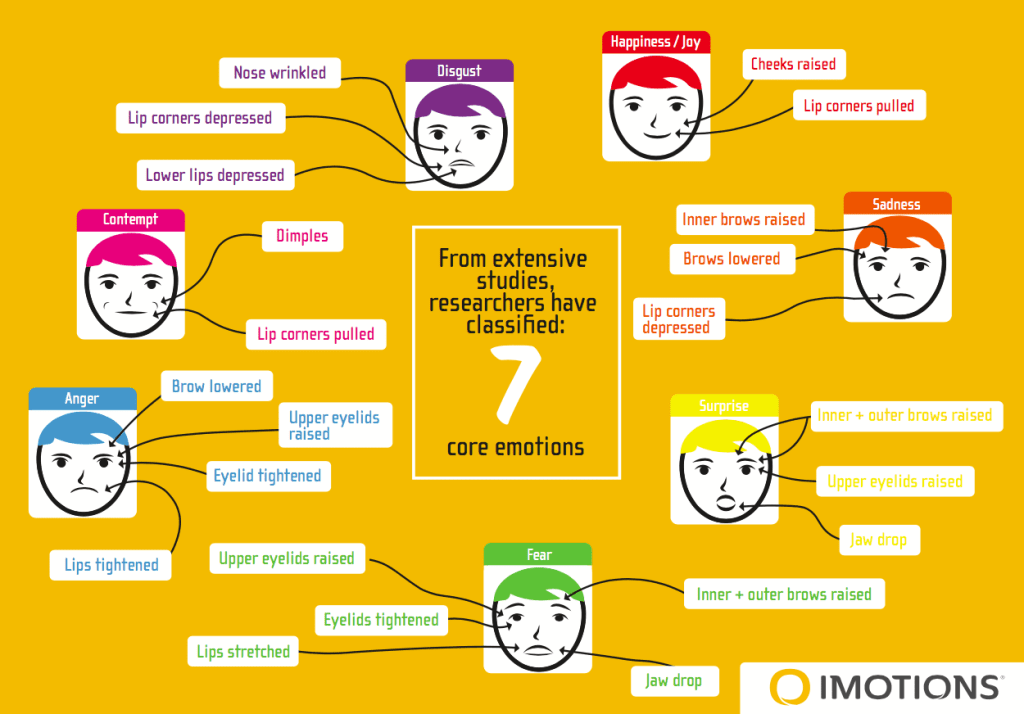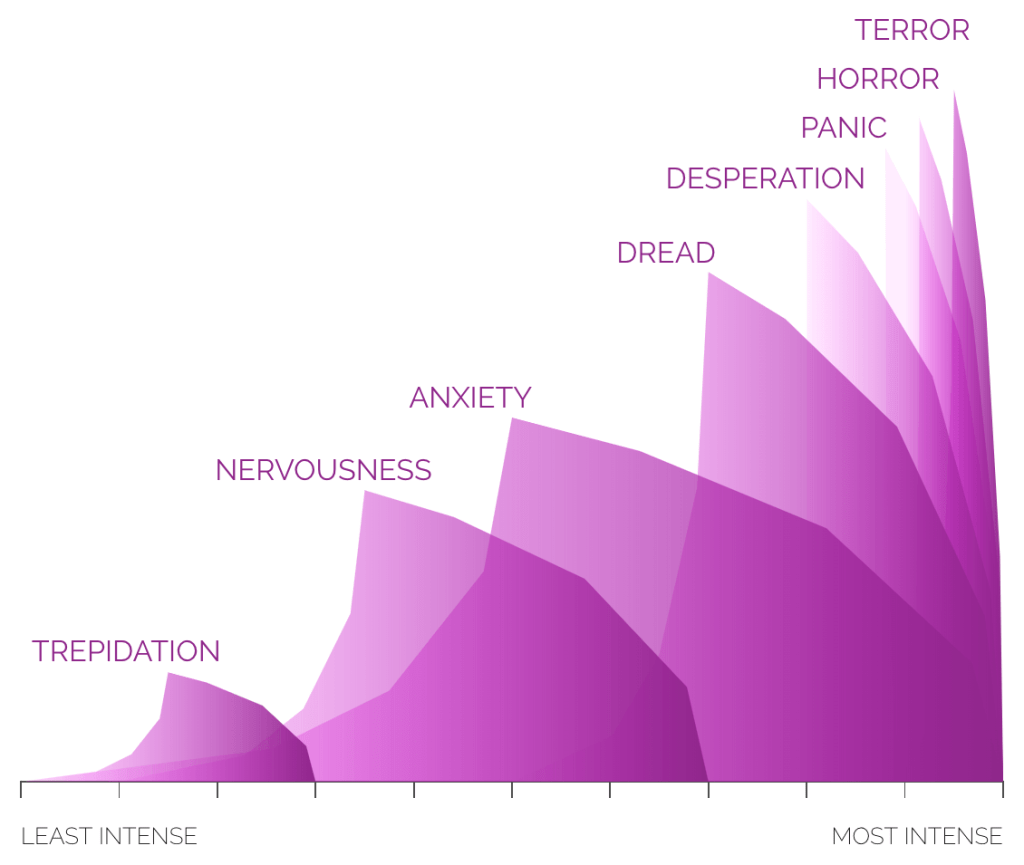What’s up with fear? I get the survival component: we wouldn’t be a successful species if we all wanted to play with gorillas, but does it have to be so persistent during non-dire situations? I don’t like racing hearts and flop sweats. [i]
I’m afraid frequently. Partly because I suffer from anxiety and partly because I’m a Gemini. Half of me is a big, fat chicken. I’m frightened of spiders. Of loud noises. Men. Serious heights. Being out of control. Men. Angry cats. Anaphylaxis. Looking foolish. Men in groups.
My fears lack perspective.
I’m not alone with my fear. It’s a popular sport. It’s even must-see tv.
Fear can be amorphous or specific (aka phobias). You can be victimized by your fears, manage your fears, or deny your fears.
You can listen to Tears for Fears.
Some people judge fear. They suggest feeling fear means you’re of weak character. You’re not. Nor is feeling fear a sign of cowardice. Fear is but an emotion, and emotions are morally neutral. Fear is about one’s character the way bread is about one’s character. Our feelings don’t need to be judged, and we should stop doing that. Actions, however…
Fear is relatable. We all go there. As it happens, it’s one of the seven universal human emotions. I didn’t even know that was a thing. [ii]At any rate, there are seven basic feels: anger, contempt, fear, disgust, happiness, sadness, and surprise. Not surprisingly, they mirror the seven basic human facial expressions, a list I was also unaware of. As a chronically depressed person who struggles with anhedonia and a flat affect, I’d have guessed less, but that’s because of the “my reality is universal” trap.

Feeling fear is, at heart, about ensuring we avoid harm. Species reproduce. Despite our angst-driven navel-gazing, that’s our cellular purpose in life. It’s not our heart but our cells that will go on. [iii] Fear and its adaptive “fight or flight” response helps ensure this. There’s not much chance one’s genetic material will be carried forward if our inner voice doesn’t scream “flee” when a herd of raging salamanders approaches.
The point is that fear can be a source for good. It’s the thing that tells you don’t touch the flame, play chicken with dump trucks, or hand-feed a wild liger. Danger shows up, and fear causes survival things to happen. The body gets primed to deal with what’s coming. The heart rate increases, and your breath comes faster. Muscles get hard and ready. You start to sweat, so you don’t overheat when you’re fighting the zombie horde. The fear system is fantastically helpful when we need it.
It’s completely annoying when you don’t.
Not all fears need the all-in fear reaction. Not all fears represent a real danger. Anxiety and phobias are feeling-based fear reactions. Baring the trigger event, mostly the threat the body is responding to, isn’t real. Even if it feels deadly, real risk is absent. For instance, spiders used to make me almost pass out. I was frozen in terror even though the danger was negligible. Most spiders, especially in my geography, aren’t a threat. Also, I’m big, they’re small, and books are heavy.
Fear is a collective term. Popular categories of fears include the rational, primal, and irrational. [iv]
Rational fear is what it seems. It’s fear that makes sense. If bombs are falling, or volcanoes are erupting, or the car is careening out of control, a level of fear is normal and expected. It makes sense to be afraid when the risk of harm or death is high.
Primal fears are the ones our species has acquired as we’ve evolved. Being afraid of things that can end us, like snakes and fire, makes sense. Ditto the dark – we don’t see well in it – and deep water – we aren’t at our best when we float.
Then there are the irrational fears. The official phobias and the subclinical fears that impede the functioning of the people afflicted. Referred to as “irrational” not because scientists like to be insulting, but because they don’t relate to mortal injury and death.

Very few people die from public speaking, or from encountering mice, or from hearing thunder. Though they might wish they had if the irrational fear is strong enough to produce a panic reaction. Panic attacks are seriously uncomfortable beasts.
I have buckets of irrational fears. I have no idea if that makes me normal or a freak. Google doesn’t know what the average number of fears per person is either. The definitions are about quality, not quantity. I’d hoped some of my worries would age away. At what point is the dark in the basement no longer supposed to frighten?
Though I wouldn’t call it an official fear. And definitely not a phobia. It’s more like amped-up anxiety. At least my arachnophobia is no more.
That’s one of the great things about fears. You can make them go away. There’s this way or that, and all promise relief. Many of them even deliver.
I went with systematic desensitization to rid myself of my fear of spiders. It’s a pretty easy technique. You’re exposed to progressively more anxiety-provoking stimuli. Tiny spiders far away become bigger spiders moving in. I learned that fear won’t kill me, and deep breathing helps.
Being afraid, having fear isn’t wrong. I get angry when people respond to other’s fears with mockery and condescension. You aren’t a better person because you juggle spiders in your sleep, just different. Compassion and a listening ear are better responses.
Fear isn’t all or nothing. It’s not a light switch, and it’s not always zero to one hundred in a finger snap. Fear is a continuum, a gradient full of language that can pinpoint our position between chill and terrified. Where we are on that scale also influences how well we cope. The closer we get to terror, the harder it gets to respond effectively. [v]
Once again, procrastination proves to be a poor choice.

[i] I have one heart, and I know this, but the sentence sounds better when I phrase it in the plural. Perhaps it’s because I’m also a multitude? (Song of Myself, Walt Whitman)
[ii] What I don’t know is practically infinite.
[iii] “My Heart Will Go On.” Celine Dion.
[iv] I wish “irrational fears” were named something else. The list lacks flow.
[v] Except for those strange and wonderful individuals who chase fear. Thrill seekers impress and amaze me with their willingness to face fear and situations of extreme stress and risk.


I loved watching Fear Factor. Usually, I had two reactions: 1) What a wuss. 2) Wow, I wouldn’t be able to do that. The second one normally applied to a physical challenge while the first one did to eating a maggot. I CAN make myself eat something that I normally don’t, but I can’t make my body hang from a helicopter for hours.
It’s interesting that you are getting better with your fears/ phobias/ anxieties. I think I am getting worse as I age. I used to be quite a thrill-seeker. Now, I know the potential consequences and that makes me hesitate. I don’t like that. I quite hate it, in fact. So yes, I try to fight it.
LikeLiked by 2 people
That’s funny. I had the same reactions to the squeamish eaters. Suck it up, buttercup, is fifty grand!
I have this idea that I will be a fierce and relentless badass by the time I’m 80.
LikeLiked by 1 person
Go you!
LikeLiked by 1 person
The adrenaline rush of the thrill seekers is really just fight or flight response minus the cognitive appraisal of life-threateningness. My main irrational fear is spiders, but I have no desire to desensitize, because that seems irrational.
LikeLiked by 1 person
I really like that analysis of a thrill seeker. It increases my satisfaction with my non-base jumping choices 🙂
I decided to work on the spider fear because I didn’t want my kids to also freak out. It sort of worked.
LikeLiked by 1 person
Makes sense.
LikeLiked by 1 person
Where do I go to play with gorillas, is there a guided tour? 🙈🙊🙉
LikeLiked by 1 person
Right? They’re so picky on safaris. It’s like people are horrible to animals or something.
LikeLiked by 1 person
This was a really interesting read and I enjoyed what you were saying until you described yourself desensitising, and then I got the shudders and had to do some calming breaths.
It’s a pet peeve of mine that people poke fun of fears, you can’t help being afraid but it doesn’t stop you taking action.
LikeLiked by 1 person
I’m sorry that happened. I’m glad you stopped by and commented 😊
LikeLiked by 1 person
Ha no need to apologise but thanks 😊
LikeLiked by 1 person